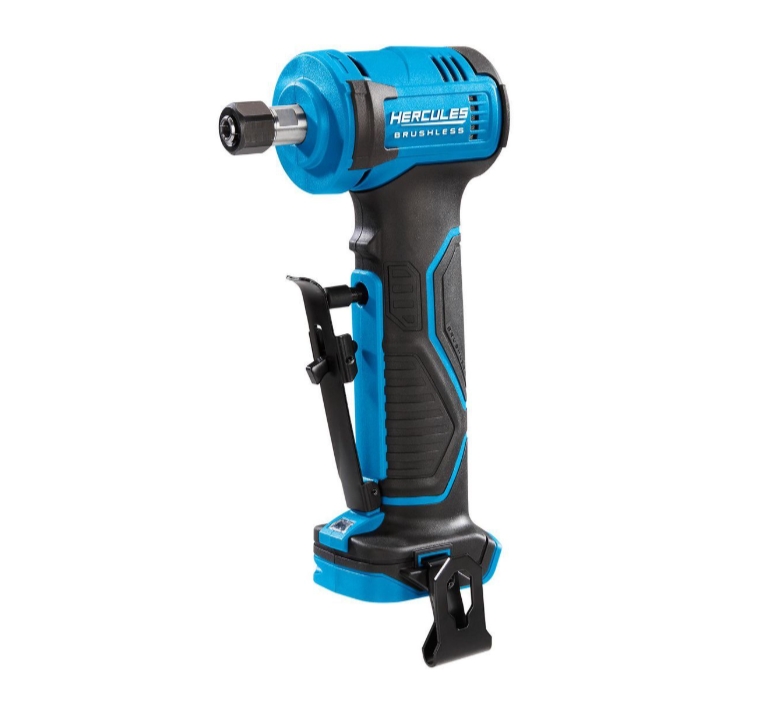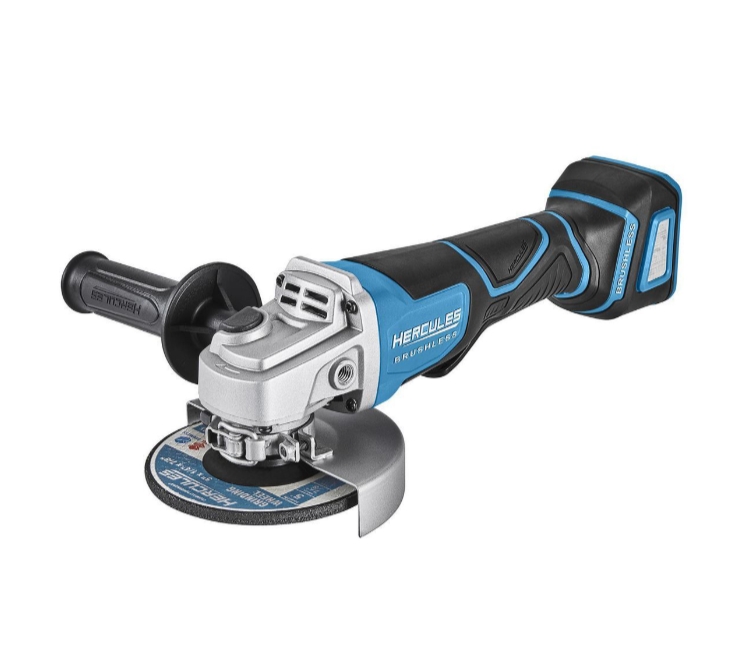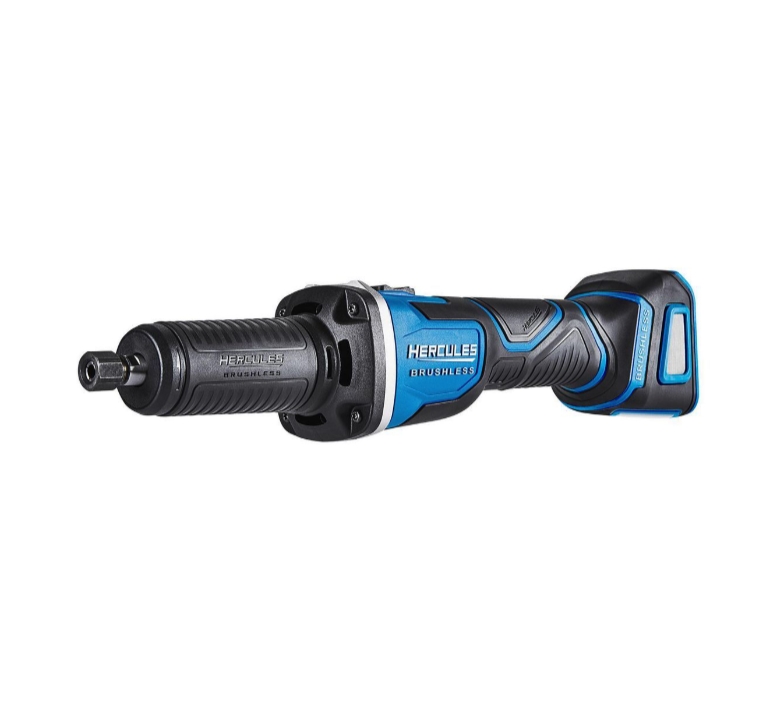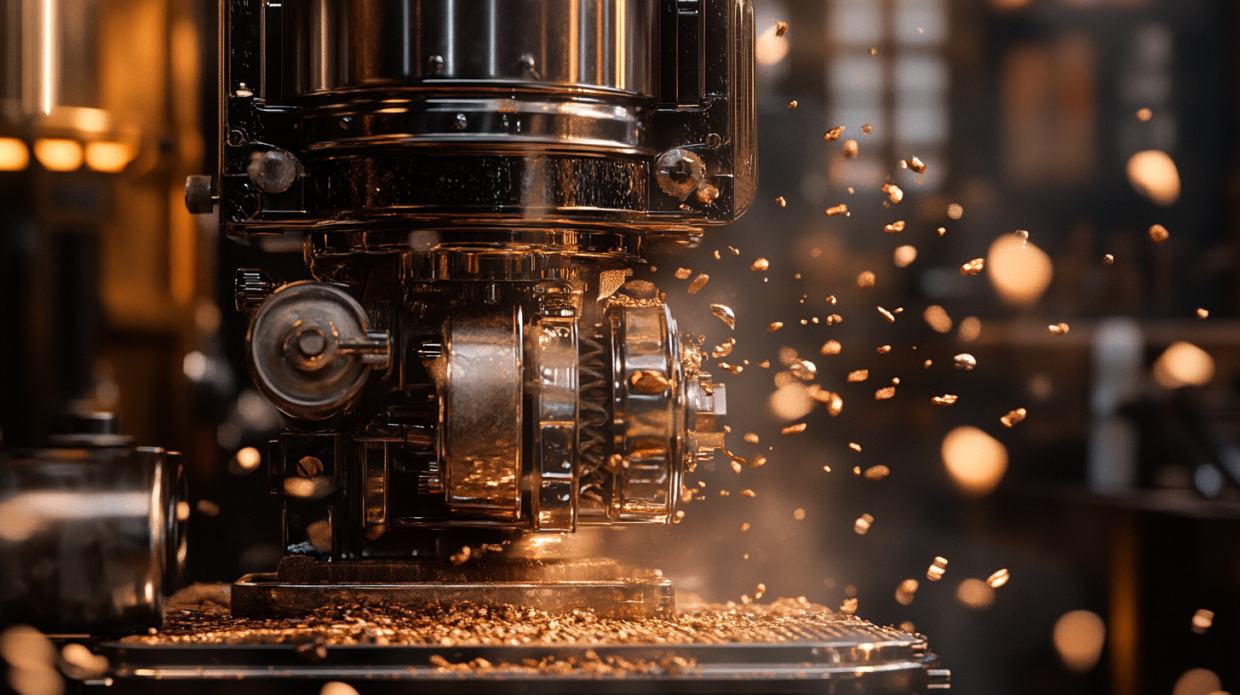
HERCULES 12V Brushless Cordless, 1/4 in. Right Angle Die Grinder – Tool Only
- This HERCULES® 12V Brushless Cordless, 1/4 in. Right Angle Die Grinder has a high-performance brushless motor that delivers speeds up to 25,000 RPM to grind, sand, polish, and machine the toughest materials. The lightweight construction reduces user fatigue. The compact size makes this grinder easy to use in confined spaces. Powered by the HERCULES® Lithium-ion Battery System, this brushless grinder goes where the job takes it.
- High-performance brushless motor for faster speeds and longer runtimes
- Variable-speed paddle switch with lock-off for maximum control
- 4-mode selector switch matches speed to application
- Precision-machined 1/4 in. collet securely holds accessories
- Compact, lightweight size for extended use in tight spaces
- Rubber overmold grip for reduced user fatigue
- LED light for increased work area visibility
$59.99

HERCULES 20V Brushless Cordless 4-1/2 in./5 in. Paddle Switch Angle Grinder – Tool Only
- Powered by a high-efficiency brushless motor, the HERCULES® 20V Brushless Cordless Angle Grinder maintains constant power in the toughest grinding and cutting applications. The compact, lightweight frame, the 2-position side handle and the lock-on switch provide ultimate comfort and control during extended periods of use. Powered by the HERCULES® Lithium Battery System, this brushless grinder goes where the job takes it.
- Powerful 20V brushless motor delivers up to 8500 RPM
- Paddle-switch trigger for increased comfort and ease-of-use when operating in various positions
- 4-1/2 in. and 5 in. tool-free adjustable Type 27 guards for quick, easy positioning, fitting 4 in. to 5 in. wheels
- Two-position side handle for added comfort and control
- Rugged aluminum gear housing and reinforced plastic body provide maximum durability
- Includes 4-1/2 in./5 in. Type 27 guard, grinding disc, side handle, arbor wrench, flange nut
$79.99

HERCULES 20V Brushless Cordless 1/4 in. Die Grinder – Tool Only
- HERCULES™ Brushless Cordless 1/4 in. Die Grinder is powered by a high efficiency brushless motor that delivers speeds up to 18,000 RPM. The die grinder maintains constant power in the toughest grinding, sanding, polishing, and deburring jobs.
- Air venting exhaust blows debris away from the user
- Compact slim barrel design with overmold grip for ultimate comfort and control
- Precision machined 1/4 in. collet securely holds accessories
- Delivers up to 30 minutes of runtime* with the 5 Ah HERCULES™ 20V battery
- Tapered neck for reaching into tight spaces
- Removable and cleanable air intake mesh screens
$69.99
When I first stepped into the world of serious DIY and metal fabrication, I quickly learned that not all power tools are created equal. After burning through two budget grinders in less than a year, I realized it was time to invest in something with staying power. That’s when I discovered Hercules grinders, and honestly, they’ve transformed my workshop experience.
Over the past three years, my Hercules grinder has become my trusted companion for countless projects—from restoring vintage metal furniture to building custom railings for my deck. I’ve put it through tests that would have destroyed my previous tools, and it’s emerged victorious every time.
If you’re considering adding a Hercules grinder to your arsenal, you probably have questions. Is it worth the investment? How does it compare to other brands? What model is right for your needs? As someone who’s been there and done that, I’m excited to share everything I’ve learned about these powerful machines—the good, the bad, and everything in between.
What Exactly Is a Hercules Grinder and What Can It Do?
The first time I held a Hercules grinder, what struck me was its substantial weight and solid feel. This wasn’t the lightweight, plastic-heavy tool I was accustomed to. Hercules grinders are professional-grade angle grinders primarily sold through Harbor Freight’s premium tool lineup.
For those unfamiliar with angle grinders in general, they’re versatile power tools designed with a rotating disc that can cut, grind, polish, or sand depending on the attachment you use. The “angle” in the name comes from the position of the grinding head, which sits at a 90-degree angle to the motor housing.
The Hercules line represents Harbor Freight’s answer to professional-grade tools, positioned to compete with established brands while maintaining a more attractive price point. They’re designed for serious DIYers and professionals who need reliability and performance without breaking the bank.
In my workshop, my Hercules grinder has become indispensable for:
- Cutting through metal pipes, rebar, and sheet metal
- Removing rust and old paint from metal surfaces
- Grinding down welds for a clean finish
- Sharpening tools like lawn mower blades
- Cutting tiles and concrete with the right disc
- Polishing metal to a mirror finish
Last summer, I took on a project restoring an old wrought iron gate that had been neglected for decades. The Hercules made quick work of removing years of rust and multiple layers of peeling paint. What could have been days of manual scraping became hours of efficient power grinding. The difference in my productivity was night and day.
The versatility is what makes these tools so valuable in any workshop. With the right attachments, a single Hercules grinder can replace several specialized tools. It’s like having a Swiss Army knife for metal and masonry work.
Hercules vs. The Competition: How Do They Stack Up?
Before investing in my Hercules, I researched extensively and even borrowed friends’ tools from different brands. Here’s my honest assessment of how Hercules compares to other popular options:
Hercules vs. DeWalt
DeWalt has long been the standard-bearer for professional power tools. When comparing my Hercules to my neighbor’s DeWalt:
- Power: Surprisingly comparable performance. Both cut through 1/2″ rebar with minimal fuss.
- Build Quality: DeWalt feels slightly more refined in the hand, but the Hercules is no slouch.
- Durability: After three years, my Hercules is still going strong with regular use. My neighbor’s DeWalt is older but has required brush replacement.
- Ergonomics: DeWalt has a slight edge in handle comfort for extended use.
- Price: The Hercules typically runs 30-40% less than the equivalent DeWalt model.
I remember a weekend where my friend’s DeWalt was in the shop, and he borrowed my Hercules for a fencing project involving metal posts. His exact words after using it all day: “I genuinely can’t believe this costs so much less than my DeWalt.” That’s when I knew I’d made a solid choice.
Hercules vs. Milwaukee
Milwaukee tools command premium prices and have a devoted following among professionals. Comparing to a colleague’s Milwaukee:
- Power: Milwaukee has a slight edge in sustained power for heavy-duty applications.
- Battery Life: For cordless models, Milwaukee’s battery ecosystem is superior.
- Weight: Hercules is slightly heavier, which some find adds stability while others prefer Milwaukee’s lighter touch.
- Cost: Milwaukee premium models can cost nearly twice what you’ll pay for a Hercules.
- Warranty: Milwaukee offers significantly better warranty coverage.
The Milwaukee difference becomes most apparent during all-day, heavy-duty use. For my weekend warrior projects, the Hercules performs admirably, but professionals putting in 40+ hours a week might appreciate Milwaukee’s refinements.
Hercules vs. Budget Brands
This is where Hercules truly shines. Compared to true budget brands like Chicago Electric or Genesis:
- Power Consistency: Budget brands often lose power under load; the Hercules maintains consistent RPMs.
- Durability: I went through two budget grinders in a year; my Hercules is in year three and counting.
- Vibration Control: Significantly less hand fatigue with the Hercules.
- Safety Features: Better guard design and switch placement.
- Cost of Ownership: While initially more expensive, the longer lifespan makes Hercules cheaper in the long run.
When I was restoring my vintage motorcycle, I attempted to use my old budget grinder to remove paint from the gas tank. It overheated within 15 minutes and shut down. My Hercules worked continuously for over an hour without issue, maintaining consistent power throughout. That moment sealed my loyalty to the brand.
Key Features That Make Hercules Grinders Stand Out
What specific features set Hercules grinders apart? After extensive use, here are the elements I’ve come to appreciate most:
Powerful Motors That Don’t Quit
The heart of any grinder is its motor, and this is an area where Hercules doesn’t cut corners. The standard 4.5-inch models typically feature 7-11 amp motors (depending on the model) that deliver between 11,000-12,000 RPM.
What impressed me most wasn’t the speed on paper but how it performed under load. When cutting through thick metal stock for my workbench build, the motor maintained consistent power without the bogging down I experienced with lesser tools. The brushes are high-quality carbon compositions that last significantly longer than budget alternatives.
During my shed construction project last fall, I had to cut through dozens of corrugated metal roofing sheets. The Hercules maintained consistent speed throughout what ended up being about four hours of intermittent cutting. My previous grinders would have required multiple cooling-down periods during the same job.
Ergonomics and Vibration Control
One often overlooked aspect of quality grinders is how they feel during extended use. The Hercules features:
- A rubberized grip that reduces hand fatigue
- Anti-vibration side handle that makes a significant difference during long sessions
- Balanced weight distribution that prevents wrist strain
- Slim body design for access to tight spaces
I particularly appreciate the vibration control during winter projects in my unheated garage. With my old grinder, the vibration would make my hands uncomfortably numb after just 20 minutes in cold conditions. With the Hercules, I can work comfortably for over an hour before needing a break.
Durability Features
Hercules incorporates several design elements that enhance longevity:
- Metal gear housing (versus plastic on budget models)
- Sealed ball bearings that resist dust infiltration
- Armature winding designed for heat resistance
- Reinforced brushes with easy access for replacement
- Impact-resistant external housing
After accidentally dropping my grinder from workbench height onto a concrete floor (something I don’t recommend testing!), I was shocked that it continued working without issue. The only damage was a small scuff on the housing—a testament to the build quality.
Safety Considerations
Safety features on the Hercules line include:
- Tool-free guard adjustment for quick repositioning
- Paddle switch with lock-off button to prevent accidental activation
- Soft start technology that reduces initial torque (on some models)
- Spindle lock for quick accessory changes
- Integrated dust ejection system that keeps the motor cleaner
These features aren’t just marketing points—they make a real difference in day-to-day use. The tool-free guard adjustment, in particular, means I’m much more likely to position the guard properly for each task rather than leaving it in an inconvenient position because it’s a hassle to change.
Exploring the Hercules Grinder Lineup: Which Model Is Right for You?
Hercules offers several different models to suit various needs and budgets. Here’s a breakdown of the main options:
Corded Models
4.5-inch Angle Grinder (7.5 Amp)
- Entry-level option suitable for occasional use
- Lightweight design at approximately 4.2 lbs
- Price range: $39.99-$49.99
- Best for: DIY enthusiasts with light-duty needs
4.5-inch Angle Grinder (11 Amp)
- Mid-range option with significant power upgrade
- Enhanced thermal management for longer run times
- Price range: $59.99-$69.99
- Best for: Serious DIYers and light professional use
7-inch Angle Grinder (15 Amp)
- Heavy-duty option for demanding applications
- Larger wheel size for deeper cuts and more material removal
- Price range: $79.99-$99.99
- Best for: Professional users and challenging materials
Cordless Models
20V 4.5-inch Brushless Angle Grinder
- Combines portability with impressive power
- Runtime of approximately 20-25 minutes of continuous use
- Price range: $99.99-$129.99 (tool only)
- Best for: Job sites without power access or projects requiring mobility
20V 7-inch Brushless Angle Grinder
- Maximum cordless performance for demanding applications
- Enhanced battery management system
- Price range: $149.99-$179.99 (tool only)
- Best for: Professional users who need cord-free convenience
My personal journey started with the 4.5-inch 11 Amp corded model, which has proven to be the sweet spot for my needs. It offers professional-level performance at a price point that didn’t make me wince. When I later added a cordless model to my collection for outdoor projects away from power sources, I noticed it provided about 85% of the power of my corded version—more than adequate for most applications.
If you’re trying to decide which model fits your needs, consider:
- Project scale: For occasional light use, the 7.5 Amp model is sufficient. For regular work with metals or masonry, the 11 Amp provides necessary headroom.
- Material types: If you’ll be cutting through thick metal or concrete regularly, the 7-inch model offers advantages in depth of cut and durability.
- Work location: If you frequently work away from power sources, the investment in a cordless model makes sense despite the higher initial cost.
- Budget considerations: Remember that the true cost includes the tool, accessories, and potential replacement if you underbuy. Sometimes spending a bit more upfront saves money over time.
Where to Buy a Hercules Grinder (And What to Watch For)
Unlike brands available through multiple retailers, Hercules tools are primarily sold through Harbor Freight. Here are your purchasing options:
In-Store at Harbor Freight
The most direct option is visiting a physical Harbor Freight store. Benefits include:
- Opportunity to physically handle the tool before purchasing
- Immediate availability (no shipping wait)
- Access to in-store promotions and coupons
- Staff assistance with questions (though expertise varies by location)
I purchased my first Hercules during an in-store sale event and saved about 15% off the standard price. The ability to feel the weight and ergonomics before buying was valuable in confirming it was substantially better than the budget options I’d been considering.
Online Through Harbor Freight
If you don’t have a store nearby:
- HarborFreight.com offers the complete Hercules lineup
- Free shipping is often available with minimum purchases
- Online-exclusive promotions may offer better pricing
- Detailed specifications and user reviews provide helpful context
When I added the cordless model to my workshop, I ordered online during a holiday sale. The process was smooth, and the tool arrived well-packaged within a week.
Third-Party Resellers
You might occasionally find Hercules grinders through eBay, Facebook Marketplace, or other resellers. I’d advise caution with these options:
- Warranty may not be transferable or valid
- Condition may not be as described
- Pricing is often not advantageous versus buying new
- Risk of counterfeits or modified tools
The peace of mind from purchasing through authorized channels is generally worth any small premium you might pay compared to secondary markets.
The Real Cost: What to Expect to Pay for a Hercules Grinder
Pricing is where Hercules has positioned itself cleverly in the market—offering professional-grade features at mid-range prices. Current pricing typically falls in these ranges:
- Entry-level 4.5″ models: $39.99-$59.99
- Professional-grade 4.5″ models: $59.99-$79.99
- 7″ heavy-duty models: $79.99-$119.99
- Cordless models: $99.99-$179.99 (tool only)
For cordless options, remember to factor in the cost of batteries and chargers if you don’t already own compatible ones. A complete cordless setup with two batteries and a charger typically adds $100-$150 to the base tool price.
To put this in perspective, comparable models from premium brands like DeWalt or Milwaukee typically cost 30-50% more for similar specifications. The value proposition becomes even clearer when you consider performance-to-price ratio.
Harbor Freight frequently runs promotions on Hercules tools, including:
- Seasonal sales (especially around Father’s Day, Black Friday, and Christmas)
- Coupon promotions (though less common on premium lines than budget tools)
- Bundle deals with accessories or batteries
I’ve found the sweet spot for purchasing is typically during these promotional periods. My cordless model was purchased during a holiday sale that included a free battery—essentially a $60 value that significantly enhanced the deal.
Safety First: Using Your Hercules Grinder Without Losing Fingers
Before diving into performance and accessories, I want to address safety. Angle grinders are among the most dangerous handheld power tools, capable of causing serious injury in the blink of an eye. Having witnessed a close call in a friend’s workshop (fortunately with no lasting damage), I take grinder safety extremely seriously.
Essential Safety Gear
Never operate a grinder without:
- Eye protection: Full safety glasses or a face shield (regular glasses are insufficient)
- Hearing protection: Grinders operate at noise levels that can cause hearing damage
- Gloves: Heavy-duty work gloves protect from sparks and debris
- Appropriate clothing: No loose sleeves or jewelry that could catch in the rotating disc
- Respiratory protection: Especially when cutting concrete, masonry, or painted materials
I learned the importance of proper face protection the hard way when a tiny metal fragment managed to get under my safety glasses during an early project. The resulting eye irritation and doctor visit was a powerful lesson in not cutting corners on safety gear.
Workspace Considerations
- Always work in a well-ventilated area
- Keep flammable materials far from your work area (grinders produce streams of sparks)
- Secure your workpiece properly using clamps or a vise
- Ensure stable footing and good balance before powering on
- Never operate grinders on ladders or in awkward positions
- Have a fire extinguisher within reach when working with materials that produce sparks
When I set up my dedicated metal working station, I intentionally positioned it away from my woodworking area and installed a metal backdrop to catch sparks. This simple precaution has prevented multiple potential fire hazards.
Operating Techniques
- Always maintain firm control with both hands
- Position yourself so that sparks and debris fly away from your body
- Let the tool reach full speed before contacting your workpiece
- Don’t force the tool—let the grinder do the work at its own pace
- Always unplug corded models (or remove battery from cordless versions) before changing discs
- Never remove or modify guards or safety features
- Allow the disc to come to a complete stop before setting the tool down
One technique that dramatically improved my results was learning to use the correct portion of the disc for cutting. Using the “leading edge” rather than the “bottom” of the disc provides better control and reduces the risk of kickback.
Specific Hercules Safety Features
The Hercules grinders include several safety features worth understanding:
- Paddle switch with lock-off: Prevents accidental activation and provides quick shutdown
- Tool-free guard adjustment: Makes it easy to position the guard optimally for each task
- Anti-restart function: Prevents the tool from starting unexpectedly after a power interruption
- Soft start (on some models): Reduces the initial jerk when powering on
These features aren’t just marketing points—they’ve directly contributed to my incident-free experience with these tools. The paddle switch, in particular, has prevented potential problems when I’ve accidentally bumped the tool while reaching for something on my workbench.
Accessories: Expanding Your Hercules Grinder’s Capabilities
The true versatility of any angle grinder comes from its accessories. With the right attachments, your Hercules can transform from a cutting tool to a polishing tool to a paint remover and beyond.
Essential Cutting Discs
- Metal cutting discs: Thin abrasive discs designed specifically for cutting metal
- Diamond masonry discs: For cutting tile, stone, and concrete
- Segmented diamond blades: Better for concrete and tough masonry materials
- Continuous rim diamond blades: For precision cuts in tile
I keep a variety of metal cutting discs on hand in different thicknesses. The ultra-thin discs (1mm) make clean cuts with minimal material loss, while thicker discs (3mm) provide longer life for rough cutting tasks.
Grinding and Surface Preparation
- Grinding discs: Thicker abrasive discs designed for material removal
- Flap discs: Excellent for grinding and finishing in one tool (available in various grits)
- Wire cup brushes: Perfect for removing rust, paint, and scale
- Stripping discs: Specialized for paint and coating removal without gouging metal
My personal favorite is the flap disc—essentially sandpaper arranged in overlapping flaps around the disc. These allow me to grind down welds and then, with a slight angle adjustment, polish the surface to a smooth finish without changing accessories.
Specialized Attachments
- Polishing pads: For bringing metal to a mirror finish
- Dust shrouds: Connect to vacuum systems for cleaner operation
- Surface conditioning pads: Non-woven abrasive pads for final finishing
- Chain carving discs: For wood sculpting (use with extreme caution!)
For my restoration projects, I’ve found the combination of a wire cup brush followed by progressively finer flap discs and finishing with a polishing pad transforms even severely weathered metal into showcase-worthy pieces.
Compatibility Considerations
Hercules grinders use standard accessory mounting systems compatible with most major brands. Key specifications to match:
- Disc diameter: Typically 4.5″ or 7″ (must match your grinder size)
- Arbor hole size: Usually 7/8″ for 4.5″ discs and 1″ for 7″ discs
- Maximum RPM rating: Must exceed your grinder’s no-load speed (never use an accessory rated lower than your tool’s RPM)
I’ve had excellent results with both Hercules-branded accessories and quality third-party options from brands like Diablo and Norton. While it’s tempting to save money on bargain accessories, I’ve found that premium cutting and grinding discs last significantly longer and perform better, ultimately providing better value.
Changing Discs: A Quick Guide to Getting it Right
One of the most basic but essential skills for any grinder owner is properly changing discs. The process for Hercules grinders is straightforward:
- Disconnect power: Unplug corded models or remove battery from cordless units
- Engage spindle lock: Press and hold the spindle lock button (typically on top of the gear housing)
- Remove flange nut: Use the included spanner wrench to loosen the flange nut (remember: standard right-hand thread – turn counterclockwise to loosen)
- Remove old disc: Lift off the old disc and inspect the inner flange for debris
- Install new disc: Place new disc on the spindle, ensuring it seats properly against the inner flange
- Replace and tighten flange nut: Re-install the flange nut and tighten with the spanner wrench while holding the spindle lock
- Test operation: Before cutting, run the grinder briefly to ensure the disc is properly seated and balanced
A few pro tips I’ve learned:
- Always inspect new discs for cracks or damage before installing
- Never use a disc that has been dropped, as invisible fractures may have formed
- Position the guard appropriate to your task before starting work
- Tighten the flange nut firmly but avoid over-tightening, which can damage the disc
When I’m working on extended projects, I keep a few pre-loaded discs ready to go. This allows for quick changes when switching between cutting, grinding, and finishing operations.
Hercules vs. DeWalt: A Direct Comparison
One question I frequently get from friends looking to upgrade their tools is how Hercules directly compares to workshop staple DeWalt. Having used both extensively, here’s my detailed breakdown:
Power and Performance
- Cutting Speed: Virtually identical in 4.5″ models with similar amp ratings
- Sustained Performance: DeWalt maintains power slightly better during extended heavy use
- Start-up Torque: DeWalt has a slight edge, particularly in their premium models
- Vibration: Comparable in newer models; older Hercules had more vibration
Build Quality and Durability
- Gear Housing: Both use metal; DeWalt’s casting feels slightly more precise
- Bearings: Both use sealed bearings; DeWalt’s typically last longer under daily professional use
- Switch Durability: DeWalt’s switches have proven more durable in dusty environments
- Overall Longevity: For weekend warriors, negligible difference; for daily professional use, DeWalt edges ahead
Ergonomics and Usability
- Handle Comfort: DeWalt’s ergonomics are superior for extended use
- Weight Distribution: DeWalt feels better balanced, especially when using heavier accessories
- Control Placement: Both have well-positioned controls; DeWalt’s lock-on feature is better designed
- Dust Protection: DeWalt has better internal dust shielding for motors and switches
Value Proposition
- Initial Cost: Hercules typically 30-40% less expensive for comparable specifications
- Accessory Compatibility: Identical (both use standard mounting systems)
- Warranty: DeWalt offers 3-year limited warranty vs. Hercules’ 90-day standard warranty
- Long-term Value: For occasional to regular use, Hercules offers better value; for daily professional use, DeWalt’s longer lifespan may justify the premium
When my contractor friend needed to outfit his three-person crew, I recommended a mix: DeWalt for the daily user and Hercules for the backup tools and occasional users. This strategy provided professional performance while stretching his budget significantly further than going all-in on premium brands.
Maintaining Your Hercules Grinder for Maximum Lifespan
Proper maintenance has extended the life of my Hercules tools far beyond what I initially expected. Here’s my routine that has kept my grinders running like new:
Regular Cleaning
After each use (or at least weekly for frequent users):
- Blow out dust from vents using compressed air (wear eye protection!)
- Wipe down exterior surfaces with a clean cloth
- Inspect and clean the guard mechanism
- Check the power cord for any damage or wear (for corded models)
For deeper cleaning (monthly or after heavy use):
- Remove the outer housing (if user-serviceable on your model)
- Carefully clean accumulated dust from motor components
- Inspect brushes for wear (replace if less than 1/4″ remains)
- Check and tighten any loose screws or fasteners
The difference between a well-maintained grinder and a neglected one becomes apparent after about a year of use. My diligently maintained Hercules runs as smoothly as the day I bought it, while I’ve seen others develop excessive vibration and overheating issues from neglect.
Lubrication
Every 3-6 months (depending on usage):
- Apply a small amount of gear lubricant to the gearbox (if accessible on your model)
- Lightly oil the guard pivot points with machine oil
- Apply a drop of lightweight oil to the spindle lock mechanism
Be careful not to over-lubricate—excess oil attracts dust and can create a abrasive paste that accelerates wear.
Storage
Proper storage significantly impacts tool longevity:
- Store in a dry location away from extreme temperatures
- Use the original case or a dedicated tool bag
- Keep cutting wheels separate to prevent damage
- For cordless models, remove batteries during extended storage
- Store with the guard installed to protect the spindle threads
I built a simple wall-mounted tool organization system that keeps my grinders and accessories readily accessible while protecting them from damage. This simple step has eliminated the frustration of searching for components while ensuring everything stays in good condition.
Troubleshooting: When Your Hercules Grinder Acts Up
Even quality tools occasionally develop issues. Here are solutions to common problems I’ve encountered or helped others resolve:
Grinder Won’t Start
Potential causes and solutions:
- No power: Check outlet, cord connections, and circuit breakers
- Worn brushes: Replace if visibly worn (consult manual for access method)
- Switch failure: Test continuity with multimeter; replacement switches are available
- Internal wiring issue: May require service center repair if not comfortable with electrical work
When my neighbor’s Hercules wouldn’t start after two years of heavy use, a simple brush replacement brought it back to life in minutes—a $10 fix versus replacing the entire tool.
Excessive Vibration
Potential causes and solutions:
- Unbalanced or damaged disc: Replace with new disc
- Bent spindle: Usually requires service center repair
- Worn bearings: Listen for grinding noise accompanying vibration
- Loose components: Check and tighten all accessible fasteners
After dropping my grinder from bench height, I experienced concerning vibration. After checking the obvious (disc balance), I discovered a slightly bent flange that was causing the disc to run unevenly. A $5 replacement part solved the problem completely.
Overheating
Potential causes and solutions:
- Ventilation blockage: Clean all vents and internal dust
- Pushing too hard: Let the tool do the work; don’t force it
- Extended runtime beyond design capacity: Implement cooling breaks (5 minutes rest after 15 minutes use)
- Internal dust buildup: Thorough cleaning of motor components
During a particularly demanding metal cutting project, my Hercules began to overheat. After allowing it to cool and thoroughly cleaning the vents, I adjusted my work pattern to include regular cooling breaks. This solved the issue and protected the tool from potential damage.
Unusual Noises
Potential causes and solutions:
- Grinding or squealing: Usually indicates bearing issues
- Clicking or knocking: May suggest loose internal components
- Buzzing or electrical arcing: Often related to brush or commutator problems
- Whining under load: Could indicate gearbox issues or lack of lubrication
When my Hercules developed a concerning squeal after about two years, I initially feared major damage. After disassembly and inspection, I discovered the issue was simply dry bearings. A small application of appropriate lubricant resolved the problem completely.
Warranty and Support: What to Expect
One area where Hercules has traditionally lagged behind premium brands is warranty coverage. Standard warranty terms include:
- 90-day standard warranty: Covers defects in materials and workmanship
- Extended warranty options: Available for purchase at the time of tool purchase
- 1-year and 2-year extended plans: Typically add $10-$30 to the purchase price
While the standard 90-day warranty is shorter than many competitors (DeWalt offers 3 years, Milwaukee up to 5 years), Harbor Freight has been steadily improving their customer service and warranty handling. When I had an issue with a switch failure just within the warranty period, the replacement process was straightforward and handled without hassle.
For professional users who depend on their tools daily, I recommend the extended warranty for peace of mind. For occasional DIY use, the standard warranty is likely sufficient given the tool’s reliability.
Real-World Projects: What I’ve Accomplished with My Hercules Grinder
To give you a concrete sense of what these tools can handle, here are a few of the more demanding projects I’ve completed with my Hercules grinders:
Metal Patio Furniture Restoration
Last spring, I rescued a set of vintage wrought iron patio furniture that had been neglected for decades. Using my Hercules with wire cup brushes followed by flap discs, I was able to:
- Remove multiple layers of peeling paint
- Eliminate deep rust that had pitted the metal
- Smooth out rough edges and old repair welds
- Prepare the surface for new powder coating
The process took a full weekend, with the grinder running for approximately 12 hours total over two days. It maintained consistent power throughout without overheating or showing signs of strain.
Custom Fire Pit Construction
Using 1/4″ steel plate and reclaimed propane tank material, I constructed a custom outdoor fire pit. The Hercules was essential for:
- Cutting precise curves and openings in heavy steel
- Grinding down rough edges after cutting
- Preparing weld joints for clean connections
- Smoothing finished welds for a professional appearance
The ability to quickly switch between cutting discs and grinding attachments made the workflow efficient. The consistent power delivery meant clean cuts through thick steel without bogging down.
Basement Concrete Repair
When water damage required removing and replacing a section of my basement floor, the Hercules with a diamond masonry blade allowed me to:
- Cut clean, straight lines through 4″ concrete
- Create precise openings for new drain installation
- Smooth rough edges after removal
This project really tested the dust protection on the grinder, as concrete cutting produces enormous amounts of fine dust. Despite the challenging conditions, the tool performed flawlessly and continues to run well after the abuse.
Final Verdict: Is the Hercules Grinder Right for You?
After several years of owning and using Hercules grinders, here’s my honest assessment of who should—and shouldn’t—buy these tools:
The Hercules Grinder Is Ideal For:
- Serious DIYers and Weekend Warriors: If you tackle ambitious projects but don’t use tools daily, the Hercules offers professional performance at a reasonable price point.
- Budget-Conscious Professionals: For tradespeople who need reliable tools but are watching costs, Hercules offers a compelling value proposition.
- Secondary or Backup Tools: Even professionals who prefer premium brands for their primary tools often find Hercules ideal for secondary purposes or as backups.
- Specialized Use Cases: If you need a dedicated grinder for a specific purpose (like a diamond blade permanently mounted for tile work), Hercules allows you to get a quality dedicated tool without breaking the bank.
Consider Other Options If:
- You Need Extended Warranty Coverage: If the peace of mind of 3+ years of coverage is important, premium brands offer better standard protection.
- You’re Already Invested in Another Battery Platform: For cordless tools, staying within one ecosystem makes financial sense for battery compatibility.
- You Use Your Tools Daily in Professional Settings: For full-time daily use in demanding environments, the additional refinement and durability of premium brands may justify their cost.
- You Need Specialized Features: If you require specific features like advanced anti-kickback protection or variable speed control, check whether the Hercules models offer these before committing.
My Personal Experience: The Bottom Line
After putting my Hercules grinders through years of demanding use, I can confidently say they represent one of the best values in power tools today. They deliver professional-grade performance at mid-range prices, with durability that far exceeds what their cost would suggest.
For my own workshop, I’ve found that the Hercules grinders hit the perfect balance point. They’re affordable enough that I don’t hesitate to use them for challenging applications, yet powerful enough that they never feel like a compromise. Whether I’m cutting precise angles in steel for a fabrication project or rapidly removing material during restoration work, these tools consistently deliver the performance I need.
What has impressed me most is the longevity. In a world where tools often seem designed for obsolescence, my original Hercules purchase continues to perform like new after years of regular use. With proper maintenance and care, these grinders represent not just a purchase but an investment in your capability as a maker, builder, or restorer.
If you’re in the market for a new angle grinder, I’d encourage you to give the Hercules line serious consideration. The combination of power, durability, and value makes them a standout choice in an increasingly crowded power tool market. Whatever projects you’re tackling, these tools have the muscle to help you bring your vision to life—without breaking the bank in the process.







